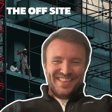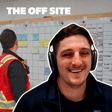
What Experience Taught Us About Construction
Join Jason and Carlos for their 100th episode, joined by members of the Aphex team with construction backgrounds. Kelvin (Engineer), Thomas Schulz (Engineer/Quantity Surveyor), and Cam Rainger (Engineer).
Breaking away from polished industry success stories, the team discusses why the most valuable learning in construction comes from project failures. The conversation explores professional mistakes and their consequences, covering trust and verification on construction teams, documentation failures, commercial risk management, and the balance between proactive problem-solving and following procedures.
Key Timestamps: 00:00 - Episode 100 introduction and celebration 03:24 - Team introductions and new format explanation 08:06 - Cam's Story 16:01 - Thomas' Story 25:40 - Carlos' Story 32:38 - Kelvin's Story Check out the Off Site Newsletter: https://offsite.aphex.co/



















